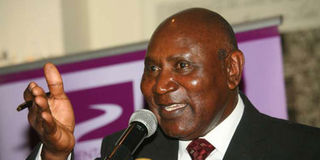Deny cash to rogue counties, ministries says Auditor-General

Auditor General Edward Ouko making a speech during the launch of the Guide to Understanding National and County Audit Reports at Stanley Hotel in Nairobi on October 12, 2016. [PHOTO | EVANS HABIL | NATION MEDIA GROUP
What you need to know:
- Mr Edward Ouko on Wednesday said denying such institutions money would instil discipline in public spending and improve services.
- Mr Ouko said for the country to make significant progress in its development agenda, public funds ought to be reallocated based on effective utilisation of resources allocated previously.
- Almost all counties are grappling with serious audit queries, with millions of shillings being spent on foreign trips at the expense of development.
- Bomet Governor Isaac Ruto was on Tuesday taken to task to explain why the county paid more than Sh9.4 million to various companies for repair of the county’s vehicles without an inspection report.
The Auditor-General has challenged Parliament to limit budgetary allocations for counties, ministries and other public institutions that fail to account for the money they receive.
Mr Edward Ouko on Wednesday said denying such institutions money would instil discipline in public spending and improve services.
“The audit reports should be a constant reference when Parliament is apportioning funds,” said Mr Ouko.
It is the job of MPs to approve how much money will be allocated to various institutions during the budgeting process.
Mr Ouko said for the country to make significant progress in its development agenda, public funds ought to be reallocated based on effective utilisation of resources allocated previously. He was speaking during the launch of a guide to understanding national and county audit reports in Nairobi.
The report is published by the Parliamentary Initiatives Network (PIN), which constitutes 18 non-State institutions with an interest in Parliament.
Mr Ouko said his office would keep improving its periodic audit reports by pointing out whether the money allocated for various projects had an impact on the ground.
Almost all counties are grappling with serious audit queries, with millions of shillings being spent on foreign trips at the expense of development, according to past reports by the Auditor-General.
Governors appearing before the Senate watchdog committee to respond to audit queries are mainly found culpable of flouting procurement guidelines.
Most county governments also fail to account for money spent on various projects.
The provision for direct procurement of goods and services has also been abused by some governors who end up awarding lucrative tenders to their relatives and friends. By avoiding competitive bidding in favour of the restrictive tendering, other genuine bidders are left out.
In one of the more recent instances, Bomet Governor Isaac Ruto was on Tuesday taken to task to explain why the county paid more than Sh9.4 million to various companies for repair of the county’s vehicles without an inspection report. Neither were the services and repairs carried out on the vehicles recorded as required by law.
National government ministries, departments and agencies (MDAs) are also grappling with expenditures that are not supported by proper records, which makes it difficult to ascertain if funds allocated have been spent in accordance with the law.
While tabling his report in Parliament in July, Mr Ouko said that during the 2014/2015 financial year, the government spent up to Sh14.4 billion on projects that had no value for money. Another Sh7.3 billion could be accounted for.
“With no value in return, the expenditure of Sh14,449,695,088 is deemed to have been wasted. Much of the wastage occurred in the course of procurement,” he said in the report he presented to MPs on July 29.
WASTED PUBLIC FUNDS
According to the report, among the ministries, departments and commissions that “wasted” public funds included the Interior Ministry (Sh4.6 billion), Agriculture (Sh2 billion), the Independent Electoral and Boundaries Commission (Sh1.9 billion), the Ministry of Education (Sh1.3 billion) and Defence (Sh1.1 billion).
On Wednesday, Mr Ouko said tax payers have a right to monitor how revenue is spent just as they are constitutionally empowered to participate in the Budget-making process.
“Audit reports should empower ordinary citizens to make right decisions.
“We must make sure we raise their consciousness through accurate and timely information that responds to Wanjiku’s concerns,” the Auditor-General said.
He challenged Kenyans to put to task leaders who misuse public resources by making use of authoritative records like the financial reports generated by his office.
Past attempts to put government institutions to account have not always been successful because reports by the Auditor-General are published long after money is misspent and lost.
There have been concerns that some budgets prepared at the national and county governments promise so much yet those charged with the responsibility of implementing the projects give a raw deal to taxpayers by flouting procedures for selfish gain.
“There comes a time when the conscious will vote for development and not parties,” Mr Ouko said in response to concerns that voters usually elect leaders based on ethnicity and party affiliation as opposed to their track record.
The Institute of Economic Affairs Chief Executive Officer Kwame Owino said the Auditor-General’s reports are important tools that Parliament relies on for oversight of the national and devolved governments.
Mr Owino, who is also the chairman of the PIN, said the guidebook launched on Wednesday would help organisations and individuals understand the language and key issues that are captured in audit reports.




